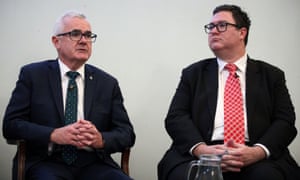Australian MPs Call On UK To Block US Assange Extradition
Boris Johnson should block attempts to extradite Julian Assange to the US, say two Australian MPs who visited the Wikileaks founder in prison, describing him afterwards as “a man under enormous pressure” and whose health and mental health had deteriorated.
George Christensen, a Liberal National MP for the ruling party in Australia told a press conference outside the gates of Belmarsh prison that he knew of information, which would come to light during the start of the extradition hearing next week, that would make people in Australia “sit up and worry”.
He said: “I think that now is the time that the government that I am a part of needs to be standing up and saying to the UK and the US: ‘Enough is enough leave that bloke alone and let him come home.”
Andrew Wilkie, an independent federal MP and the co-chair of the Bring Julian Assange Home parliamentary group, who joined Christensen in London, told a press conference in London on Tuesday morning that the extradition of Assange, who has been charged by the US with conspiring to hack into a secret Pentagon computer network, would set a dangerous precedent.
“This will establish a precedent that if you are a journalist who does anything that offends any government in the world then you face the very real prospect of being extradited to that country,” he said. “This is a political case and what is at stake is not just the life of Julian Assange. It is about the future of journalism.”
Wilkie said that Assange had “done the right thing” by publishing secret video in 2010 showing US air crew falsely claiming to have encountered a firefight in Baghdad and then laughing at the dead after launching an airstrike that killed a dozen people, including two Iraqis working for the Reuters news agency.
Speaking after he and Christensen had spent a half an hour with Assange, who they said had asked about his family and had been worried about the impact of Australia’s bushfires, he said: “He faces charges of espionage and computer hacking. If he is convicted of those charges he faces up to 175 years in prison, in a US federal prison. It’s a life sentence and could almost be said to be a death sentence. Why wouldn’t you be in there feeling under enormous pressure. That helps to explain why he is in the state that he is.”
Assange is no longer being kept in solitary confinement and his health is improving, WikiLeaks said on Tuesday. WikiLeaks spokesperson Kristinn Hrafnsson said he had been moved from solitary confinement in the medical wing to a different part of the prison with 40 other inmates after complaints from his legal team and prisoners, who had petitioned the governor.
Christensen said he had sent a letter to Johnson in which he noted that the prime minister had recently admitted that Britain’s extradition treaty with the US was “imbalanced” following the rejection of an extradition request for Anne Sacoolas, the woman accused of causing the the death of motorcyclist Harry Dunn.

Wilkie and Christensen attend a news conference in London on Tuesday. Photograph: Reuters
Christensen said: “I am a big fan of Trump, I am a big fan of Bojo [Boris Johnson] but I’ll tell you what I value more: free speech,” he said. “There are a lot of Australians on the right and left who think that Julian Assange is a rat bag, that I am a rat bag, but that he should be brought home.”
“I hope that Boris Johnson withdraws this case that is before the courts,” he said. “There is a problem here … What if it was a British journalist or an outspoken British citizen who went on holiday to another country that has an extradition treaty with China, and China wanted to extradite that British citizen?”
John McDonnell, the shadow chancellor, is expected to visit Assange in prison on Wednesday. The first part of the hearing next week at Woolwich crown court will cover arguments that the extradition is politically motivated and an abuse of process. A decision is unlikely to be handed down for several months – and even then, it is likely the losing side would appeal.
The Australian MPs’ appearance in London before the start of an extradition hearing next week came as a letter by a group of doctors representing 117 physicians and psychologists from 18 nations called for an end to what they described as “the psychological torture and medical neglect of Julian Assange”.
The letter, which was published in the medical journal the Lancet and has also been sent to the Australian foreign affairs minister, Marise Payne, expresses concern over Assange’s fitness to take part in the legal proceedings.
The letter, which echoes the concerns raised by the UN special rapporteur on torture, Nils Melzer, on Assange’s health, adds: “Should Assange die in a UK prison, as the UN special rapporteur on torture has warned, he will have effectively been tortured to death.
“Much of that torture will have taken place in a prison medical ward, on doctors’ watch. The medical profession cannot afford to stand silently by, on the wrong side of torture and the wrong side of history, while such a travesty unfolds.”
Assange’s father, John Shipton, told the BBC’s Victoria Derbyshire programme on Tuesday: “The ceaseless anxiety that Julian’s been under for now 10 years, it has had a profoundly deleterious effect. I can’t speculate on to his state of mind, but I imagine that he will be really worried because being sent to the United States is a death sentence.”
Assange is being held in Belmarsh prison in south-east London.
A US grand jury has indicted him on 18 charges – 17 of which fall under the Espionage Act – around conspiracy to receive, obtaining and disclosing classified diplomatic and military documents.
READ MORE HERE
